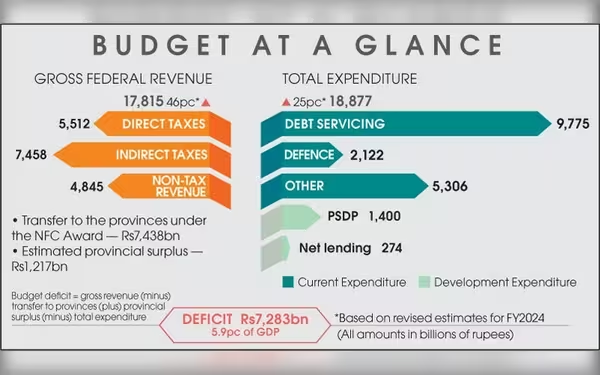Tuesday, July 2, 2024 03:36 PM
Government Introduces Major Income Tax Reforms for 2024-25
- New tax rates for different income categories to promote compliance
- Stricter measures for non-compliance to enhance tax collection
- Focus on fair taxation and discouraging tax evasion for development
 Image Credits: Dawn
Image Credits: DawnThe government has introduced significant changes to the income tax system for the fiscal year 2024-25, focusing on tax rate revisions, compliance measures, and penalties for non-compliance to create a fair and efficient tax system.
The government has introduced significant changes to the income tax system for the upcoming fiscal year 2024-25. These measures aim to streamline the tax structure and promote compliance among taxpayers. Let's delve into the key highlights of the proposed income tax reforms.
Tax Rates for Different Categories
For non-salaried individuals, associations of persons, and salaried individuals, the tax rates have been revised. Individuals with an annual income up to Rs.600,000 are exempt from tax. Beyond this threshold, non-salaried individuals face progressive tax rates ranging from 15% to 45%, while salaried individuals have tax slabs ranging from 5% to 35%. Late filers will now be subject to a new tax rate, higher than filers but lower than non-filers, to encourage timely filing of returns.
Property Transactions and Capital Gains
Progressive tax rates have been introduced for property transactions based on filer, late-filer, and non-filer categories. Filers face lower tax rates compared to late-filers and non-filers. Moreover, new tax rates have been proposed for gains from the sale of immovable property and securities acquired after July 1, 2024.
Taxation of Dividend Income
Dividend income from mutual funds and collective investment schemes will now be taxed at 15%. A higher rate of 25% is proposed for dividends from funds earning a significant portion of income from profit on debt. Export income, previously taxed at 1%, will now be subject to normal rates with a minimum tax collection of 1% on export proceeds.
Stricter Measures for Non-Compliance
To ensure compliance, strict measures have been proposed for non-compliance, including penalties for incomplete tax returns, failure to register under specific schemes, and failure to disclose relevant information. Non-filers earning income from profit on debt will face an increased advance tax rate of 35%. The scope of withholding tax is being broadened to include all sectors of the economy, targeting distributors, dealers, wholesalers, and retailers to enhance tax compliance.
Conclusion
The proposed income tax measures for the fiscal year 2024-25 aim to create a fair and efficient tax system while encouraging compliance and discouraging tax evasion. It is essential for taxpayers to understand these changes and fulfill their tax obligations to contribute to the country's development.













